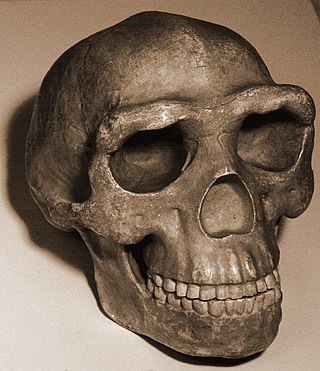Related Research Articles

Peking Man is a subspecies of H. erectus which inhabited what is now northern China during the Middle Pleistocene. Its fossils have been found in a cave some 50 km (31 mi) southwest of Beijing, known as the Zhoukoudian Peking Man Site. The first fossil, a tooth, was discovered in 1921, and Zhoukoudian has since become the most productive H. erectus site in the world. Peking Man was instrumental in the foundation of Chinese anthropology, and fostered an important dialogue between Western and Eastern science. Peking Man became the centre of anthropological discussion, and was classified as a direct human ancestor, propping up the Out of Asia theory that humans evolved in Asia.
Below are notable events in archaeology that occurred in 1937.
Below are notable events in archaeology that occurred in 1926.

Zhoukoudian Peking Man Site (周口店北京人遗址), also romanized as Choukoutien, is a cave system in suburban Fangshan District, Beijing. It has yielded many archaeological discoveries, including one of the first specimens of Homo erectus, dubbed Peking Man, and a fine assemblage of bones of the giant short-faced hyena Pachycrocuta brevirostris.

Johan Gunnar Andersson was a Swedish archaeologist, geomorphologist, and paleontologist who was closely associated with the beginnings of Chinese archaeology in the 1920s.
Below are notable events in archaeology that occurred in 1931.
Below are notable events in archaeology that occurred in 1923.
Below are notable events in archaeology that occurred in 1921.
Below are notable events in archaeology that occurred in 1949.
Below are notable events in archaeology that occurred in 1927.
Below are notable events in archaeology that occurred in 1928.
Below are notable events in archaeology that occurred in 1935.

Birger Nerman was a Swedish archaeologist, historian and philologist who specialized in the history and culture of Iron Age Sweden.

Yang Zhongjian, also Yang Chung-chien, courtesy name Keqiang (克强), also known as C.C. Young, was a Chinese paleontologist and zoologist. He was one of China's foremost vertebrate paleontologists. He has been called the "Father of Chinese Vertebrate Paleontology".
Below are notable events in archaeology that occurred in 1950.
The year 1982 in archaeology involved some significant events.
Xihoudu is an archeological site located in the Shanxi Province of China. The site dates to the Paleolithic Age. In total 32 stone implements were found at the site.

Pei Wenzhong, or W. C. Pei, was a Chinese paleontologist, archaeologist and anthropologist born in Fengnan. He is considered a founding figure of Chinese anthropology.

Jia Lanpo was a Chinese palaeoanthropologist, considered a founder of Chinese anthropology.
The Cenozoic Research Laboratory of the Geological Survey of China was established within the Peking Union Medical College in 1928 by Canadian paleoanthropologist Davidson Black and Chinese geologists Ding Wenjing and Weng Wenhao for the research and appraisal of Peking Man fossils unearthed at Zhoukoudian.
References
- ↑ Stjernquist, Berta [in Swedish] (1987). "Birger Nerman". Svenskt biografiskt lexikon (in Swedish). Vol. 26. p. 528.